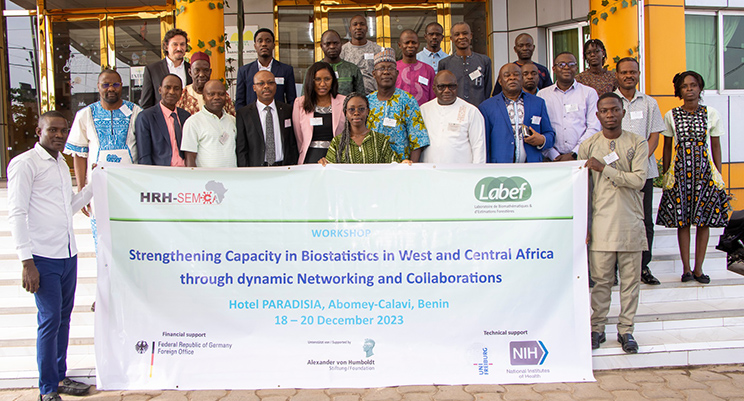TEBWA project: strengthening capacity in biostatistics in West and Central Africa through networking and collaborations

There is a critical need for biostatisticians in West and Central Africa to develop study designs, contribute as well as apply statistical methods in public health data analyses. Despite recent advances, growth in biostatistics in the region still lags, and collective efforts are needed to push the field forward. With this background, a first workshop titled “Strengthening Biostatistics Resources in sub-Saharan Africa: Networking and Collaborations” took place in The Gambia (31 August-1 September 2022). At this workshop, some ideas were put in place, and networks and collaborations started. However, there is a need to energise this networking and collaboration among West and Central African researchers and experts to ensure that each and all are working towards improving the expertise, research capacity and resources in biostatistics in the region.
Leveraging on the financial support from the Alexander von Humboldt Foundation for the Research Hub on the Socio-ecological modelling of COVID-19 in Africa coordinated by Prof. Romain Glèlè Kakaï (University of Abomey-Calavi, Benin) and hosted at the Laboratoire de Biomathématiques et d’Estimations Forestières (LABEF) at the University of Abomey-Calavi, a second regional workshop was organised in Benin from 18-20 December 2023 on the topic “Strengthening Capacity in Biostatistics in West and Central Africa through dynamic Networking and Collaborations”. The workshop brought together biostatistics experts from West and Central Africa (Benin, Cameroon, Cape Verde, DRC, Gabon, Ghana, Guinea, Nigeria, Senega and Togo), Canada, Germany, and the United States of America, as well as young researchers in the early stages of their career in biostatistics/biomathematics. Over three days, participants examined the state of capacity-building in biostatistics/biomathematics in West and Central Africa, updated their knowledge on recent advances in biostatistics/biomathematics in the region, and set up a consortium to reflect on mobilising funds to strengthen biostatistics resources in West and Central Africa.
The discussions were fruitful and led to several conclusions and recommendations, among which the creation of the “West and Central Africa Biostatistical Modelling Consortium (WesCAB)” to mobilise funding to advance research in biostatistics, and training of trainers to fill the shortage of biostatistics specialists in the sub-region.
Fellows (8 men and 7 women) from the “Training Epidemiologists and Biostatisticians for enhanced response to disease outbreak and epidemic in West-Africa” (TEBWA) project also attended this workshop. All of them joined WesCAB. This project was implemented by the consortium made up of the University of Abomey Calavi (UAC) in partnership with the Benin National Agency of Primary Health Care (ANSSP), and the London School of Hygiene and Tropical Medicine (LSHTM, UK). These TEBWA fellows brilliantly completed their Master’s training in Biostatistics and Epidemiology recently. Three of them were awarded scholarships to pursue capacity development in their field of interest (e.g. AI in public health, and advanced statistical epidemiology). One fellow was awarded a DAAD in-country/in region scholarship programme for a PhD in Biostatistics at Moi University in Kenya. Furthermore, thanks to the TEBWA project, LSTHM and UAC have strengthened their collaboration, and they are now working on other projects to support some of the TEBWA fellows to pursue their PhD in Epidemiology and Biostatistics.
